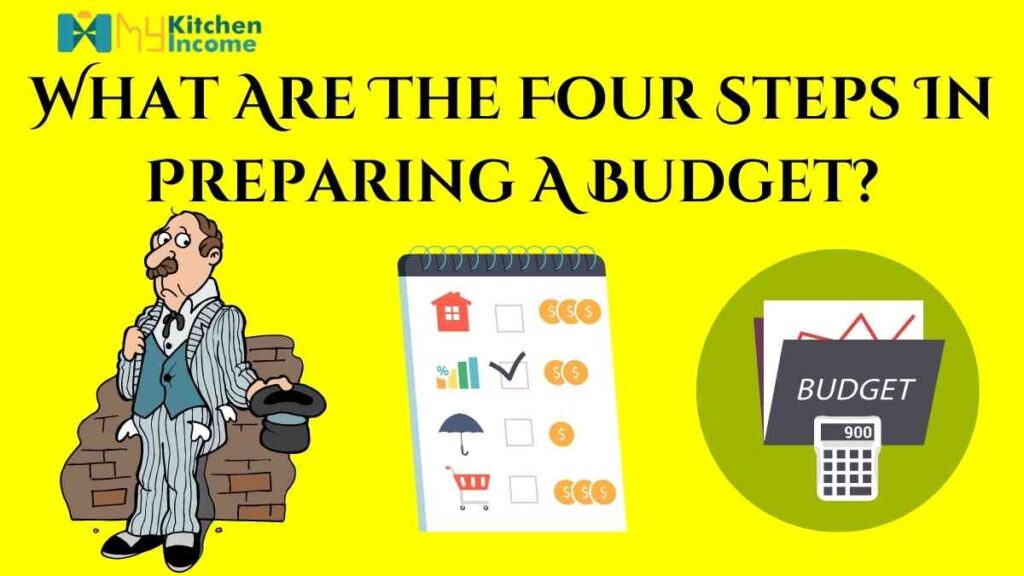We hear a lot about government budgeting. But only a few know about the procedure to bring the majority in the budget and dished out it in front of people. Our discussion topic what are the four steps in preparing a budget is not only for the government. It is also for small and large businesses to maintain their operations. In this post, we see what is budgeting, the importance of budgeting and what are the four steps in preparing a budget.

What is budgeting?
Before discussing what are the four steps in preparing a budget, we discuss what is budgeting. Budgeting is a term that refers to planning and predicting the revenue and expenses that will be generated in the coming fiscal year. It is a very important task. Without a budget, a business cannot operate efficiently. A budget helps the company to plan the amount of money that will be spent and how it will be spent. It is the responsibility of the owner of the company to prepare a budget for his company. He must make sure that he spends his money wisely.
If you don’t have a monthly budget, you will end up with a large amount of debt. You may even end up with problems like bankruptcy. To avoid such things, you must develop a plan for your monthly budget. If you don’t do this, you may end up wasting a lot of money that you will need in the future.
Your yearly budget is used to plan your financial resources for a year. It is usually used to plan your financial obligations and expenditures for a year. You can use this budget to make sure that you have enough funds to meet your long-term goals. Your annual budget should be prepared before the year starts.
What Are The Four Steps In Preparing A Budget?
In budgeting there are following four steps are used:
Preparation and submission of budget
Approval
Execution
Evaluation and audit
Now we see all these steps in detail.

Preparation and submission of budget:
To prepare your budget, you must first analyze your finances. You should know your income and expenditures for the coming year. You need to know how much money you earn from your job and the other sources of income such as social security benefits, investments, rental income, etc. You also need to know how much you spend on living expenses and your debts.
You should know your budget plan by writing down your goals, short-term and long-term goals, your total income, and your total expenditures. Then you should create a spending plan. You should plan your budget to ensure that you do not overspend. This will allow you to achieve your goals and avoid wasting your money.
And it is same for the small businesses and the government as well. Small businesses also need to make a budget for every month and start the business.
Approval:
The atmosphere in this stage of the political sphere is quite different from that of the corporate world. The CEO can stamp his approval, or not, at his discretion, after a few consultations. Politicians, like all people, have a range of opinions, both strong and weak. Instead of holding debates about the budget, the committee should approve the budget.
For example, if political leaders do not work together, they may disagree about how to address issues such as health care and taxes. As a result, the political process can negatively impact issues of priority. Large businesses with large boards are particularly susceptible to this bug. If they fall victim to it, bankruptcy is imminent during the four steps of the budgeting process.
A piece of advice to small business owners like myself who handle all four stages of the budget cycle themselves; your accountant (if you have one) or trusted colleague must go through your budget before you stamp it.
Execution of the budget:
A business should implement a budget once it’s approved. In this context, ‘execution’ means that a government reduces the amount of spending it has, and then it puts tight bottlenecks around any funds that are still available. It doesn’t have to be this way in your business. You have to devise ways of controlling your spending, and managing your income so that it matches your expectations.
During my research, I came across this quote. I feel it is true and would appreciate it if you could pass it on. A good budget isn’t a limit to what your company can spend. “Strategy and tactics are an embodiment of your company’s financial performance for the year”.
Evaluation and Audit:
This is the last and very important step of budgeting. Evaluation is very important in all aspects which we need in business. It is not only limited to the budget or finance of the business or a company. Some think this is the progress checker. No matter how good your budget is. You should check or evaluate it from time to time. Evaluate and audit it from time to time.
Also, read this How To Budget For Significant Expenses?
Conclusion:
This post tells you why and how to do budgeting. What are the four steps in preparing a budget discussed in this post? Budgeting plays an important role in any business. Different four steps tell us how we complete our budgeting.


